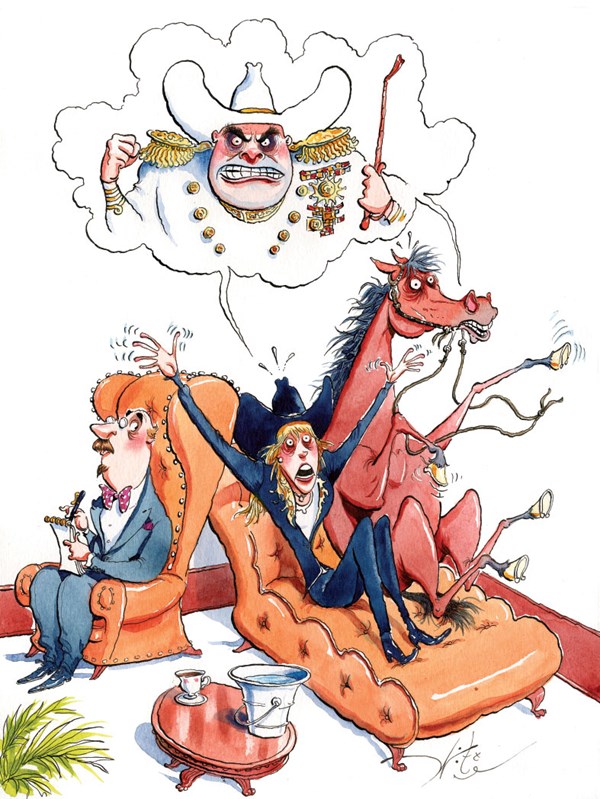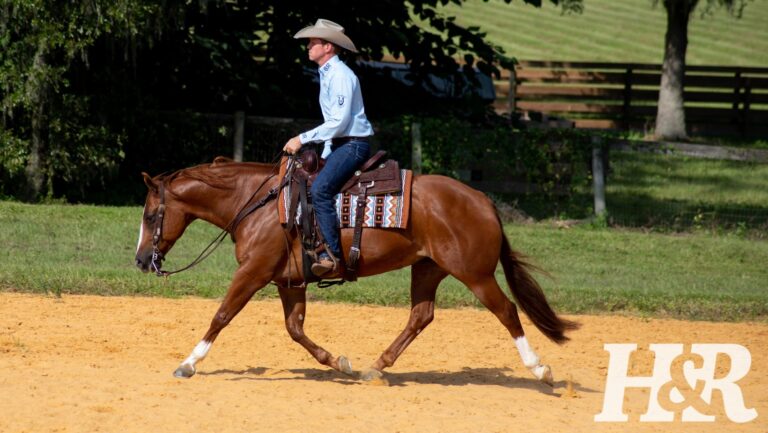
OK, we got your attention with the title—and that tells us you have (or remember having) a less-than-ideal relationship with a horse trainer. And, you’ve had times when that relationship’s driven you nuts.
Trust us, you’re not alone. Owner complaints about trainers are so commonplace, they make it easy to generalize the trainers themselves into distinctive categories—ones we’ll present here. Perhaps you’ll recognize your trainer, past or present, as you read the descriptions. There’s nothing like a taste of validation to help settle your upset stomach.
Let’s face it, though—what you really need is a way to resolve the problems (justified or not) you’re experiencing with your trainer. We’ll give you tips for understanding and coping with each of the trainer types discussed, plus some overall advice on how to know if you’re better off going elsewhere. And, we’ll provide a set of questions to help you determine whether yours is a relationship that can be saved, or whether it’s best to load up your horse and move on.
Note: For simplicity’s sake, we’ll use male pronouns in reference to the various trainer types. But rest assured, they come in both genders.
TRAINER TYPE: THE DICTATOR
Your frustrations: Sure, you understand why you have to make arrangements to take lessons. You even respect your trainer’s schedule by making appointments before dropping in (well, most of the time). Vet, feed, tack, farrier, blankets, clothing—it’s all been laid out for you by your my-way-or-the-highway trainer. You aren’t entirely sure why, but you figure you’ll catch on as you go.
But seeking permission to check up on the training progress is nothing compared to the rest of the trainer-may-I game! The Dictator puts the whoa in your desire to try a fun new class. That nice second-hand, budget-preserving silver headstall had to go back—it was plate, not overlay from a specific silversmith. You can’t go to the first show of the year without mandatory participation in a collection of winter clinics that have grown to dictate your complete holiday season (much to your family’s displeasure).
Where he’s coming from: Trainers in this group are experienced, enthusiastic, energetic, and ultimately fair. You probably admired these very traits when you first saw him interacting with clients at a show. The Dictator knows how to enhance and encourage your development as a rider, raising you to his extremely high standards.
Survival tips: Maybe it’s true that opposites attract. What you need to discover is whether you really want authoritarian leadership. Some riders, especially those with intense leadership roles in their day jobs, savor the opportunity to hand off the decision-maker role for a while. If you can set aside your desire to act independently, you might find you’ll learn and progress fast under The Dictator’s close direction.
Or, you can compromise by working with this trainer to very clearly define those elements you can own. Your expert adviser will appreciate this discussion for two reasons: First, he’ll be able to turn a few details over to you, freeing his time and using your efforts to evaluate your growth within the program. Second, with known control boundaries, tension will melt away from your lessons, allowing for real training.
Move-on cue: If you can’t set your innate control-freak nature aside, your progression and enjoyment of riding will be washed away in a sea of tension and anger. If you know this just isn’t in the cards, due to your own temperament, it’s time to do business elsewhere.
TRAINER TYPE: THE SCATTERBRAIN
Your frustrations: You love your trainer for his cheerful, sweet personality and his willingness to drop everything on your behalf when you have a special need. But his less-than-organized approach to just about everything can really get on your nerves.
You set up a lesson time—and he forgets you’re coming. You ask for a detailed bill—and he never gets around to sending you one. You need his help before a class—and he’s nowhere to be found. You assume he’s been riding your horse all week— but learn that he took off on a horse-hauling trip instead.
Where he’s coming from: Unlike some of the other trainer types, The Scatterbrain is highly responsive to the emotional needs of others—so much so, he can’t say “no” to a request for his time and attention. And because he has that charming, needs-meeting personality, plenty of people are drawn to him. That means he’s likely to be off catering to someone else at key times, instead of looking after you.
Survival tips: For this relationship to work, you’ll have to achieve a tricky balance: You’ll need to be the organized one, yet you’ll also have to be flexible enough to go with the flow most of the time, and to settle for having “your turn” when it comes around.
A plus side with this trainer type is that he’s usually quite willing to participate in a heart-to-heart when you need to get something off your chest. He won’t wall off or run you off when you need to talk about how his behavior makes you feel. In fact, he’d much rather have you bring your concerns to him than have it be discussed with others, behind his back. That doesn’t necessarily mean he’ll reform permanently after your little talk, but he will make you feel as though you’re being heard.
Move-on cue: If your desire for structure, order, and punctuality are way greater than your desire to be in a warm emotional environment, make your exit plans. You know what they say about leopards changing their spots. This trainer is who he is.
TRAINER TYPE: THE SHY GUY
Your frustrations: You want to learn. You crave instruction. You beg for guidance. And you can’t seem to get any of that. When you ask a question, you’re lucky to get a simple “yeah, sometimes,” or “sure, I guess,” which is an improvement over the shrug and stare at the dirt you earned the first few months.
When it comes to your mastery of the finer details of the sport, this trainer shrugs off your queries. Then, he makes a mental note to fix whatever you were questioning after you leave, so he doesn’t have to hear about it again. And you know that fix will happen, because every ride so far has seen your questions and concerns magically disappear in an obvious measure of real progress. You grudgingly accept that a grunt or subtle grin is enough to give you reinforcement of a good job.
Where he’s coming from: It might not be obvious, but The Shy Guy places a lot of importance on great customer service, and appreciates that trait himself. He executes his duties and obligations with a level of seriousness that stays consistently high. “Dependable” is always used to describe him. But he’s so uncomfortable with conflict, he keeps conversations short and unemotional. Inwardly, he craves the same feedback you do, but prefers to watch and listen for it rather than ask for it.
Survival tips: Of all trainer types, this is the one with whom you might initially feel like you have to take the big steps to get the audible feedback you need. Because The Shy Guy isn’t going to come out and ask you direct questions to get feedback, be sure your words and body language clearly convey your concerns and appreciations. Once he sees he can rely on you for positive, constructive feedback, he’s likely to open up.
If you’re a positive, bubbly person by nature, this won’t be a problem for you. But you’ll run into problems with this type of trainer if you tend to be overly critical, possibly even controlling. When you turn negative, this trainer will shut down, minimizing exposure to criticism in any way possible.
Move-on cue: If you don’t want to be an emotional leader, or you possess a naturally critical nature, it’s best to tell The Shy Guy goodbye.
TRAINER TYPE: THE BIOMECHANIC
Your frustrations: You still seethe at the memory of that lesson last summer, when you were subjected to a long lecture on the complete body mechanics of the last two steps of a showmanship pivot. Not practice. Just lecture. While you stood there. The whole time.
You don’t feel you need to know why this muscle affects that muscle, which affects the flight path of the hoof, which is affected by the weight of the outer bar of the shoe, provided the head and neck are at this angle to the shoulder. And heck—you don’t dare ask how a hock affects the quality of a horse’s lope, as that might require a three-day symposium!
Where he’s coming from: Trainers in this group are practical and realistic, with a healthy dose of self-confidence. Their emotional profile tends to be fairly level, so it’s hard to ruffle their feathers. They’d also rather deal with tangibles than with client emotions. Biomechanics don’t really want to discipline you or coddle your feelings as you learn. They’d rather explain the elements of a detail with the assumption you can figure it out from there.
Survival tips: The key to dealing with this trainer type is to acknowledge his need for logic and emotional distance. When you have a concern, express it in a logical, straight-forward manner. Example: When he gives you a body-part lecture, praise his detailed knowledge. Then, ask him to demonstrate what he’s talking about, and to critique you as you attempt to replicate it. Chances are, he’ll respond with equal logic and reason.
But don’t expect him to become involved in your personal life, nor respond with sympathy when you’re frustrated in a lesson or after a problematic class. He’ll want to review angles, decisions, cue sequences, and all those other dry elements outside the realm of feelings.
Move-on cue: If you need more balance between emotional and practical elements in your trainer/client relationship, it’s time to ask for that last bill. And don’t be afraid to do so, because The Biomechanic’s not likely to take it personally.
TRAINER TYPE: THE PROFESSOR
Your frustrations: Talking to this trainer is like speaking with a passionate PhD, who only occasionally interacts with actual students. Your lessons are unstructured, and you get more in the way of his personal wisdoms than specifics you can apply. He’ll let you run in circles around a decision, watching you stumble and fumble until you come up with the right answer—just like a rat in a maze. You feel more like a piece of data in a larger, long-term research study than you do an individual with needs.
Where he’s coming from: This trainer is a conceptual thinker who’s more into metaphors than specifics. He may be enthusiastic about horse training, but that enthusiasm is centered around the big picture, and not necessarily the details (including those of your emotions). He relates best to clients who’re the equivalent of brilliant, like-minded grad students—the ones who just “get it” without much in the way of ABC instruction.
Survival tips: You’ll do best with this type of trainer if you’re an independent free-thinker, who’s willing to attempt new things under supervision without getting into the nitty-gritty of “why?” You also may find it helpful to pick the brains of his more advanced students, whose experiences and explanations may help The Professor’s lessons click for you.
Move-on cue: If you’re craving detailed, individualized attention, this trainer isn’t for you. Pick up the phone and start your trainer search again.
Contributing editor April Fingerlos of Centennial, Colorado, has learned to use complaints about trainers to her advantage. They’ve helped her zero in on her own priorities as a client, making her trainer-selection process easier.






